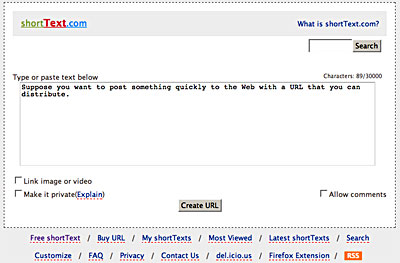Interesting post by Nick Carr about the economic implications of user-generated content.
What’s being concentrated, in other words, is not content but the economic value of content. MySpace, Facebook, and many other businesses have realized that they can give away the tools of production but maintain ownership over the resulting products. One of the fundamental economic characteristics of Web 2.0 is the distribution of production into the hands of the many and the concentration of the economic rewards into the hands of the few. It’s a sharecropping system, but the sharecroppers are generally happy because their interest lies in self-expression or socializing, not in making money, and, besides, the economic value of each of their individual contributions is trivial. It’s only by aggregating those contributions on a massive scale – on a web scale – that the business becomes lucrative. To put it a different way, the sharecroppers operate happily in an attention economy while their overseers operate happily in a cash economy. In this view, the attention economy does not operate separately from the cash economy; it’s simply a means of creating cheap inputs for the cash economy.
It strikes me that this dynamic, which I don’t think we’ve ever seen before, at least not on this scale, is the most interesting, and unsettling, economic phenomenon the Internet has produced.
Carr has written about this before. For example:
Web 2.0, by putting the means of production into the hands of the masses but withholding from those same masses any ownership over the product of their work, provides an incredibly efficient mechanism to harvest the economic value of the free labor provided by the very many and concentrate it into the hands of the very few.
Ed Felten disagrees with this analysis:
It’s a mistake, too, to think that MySpace provides nothing of real value to its users. I think of MySpace as a low-end Web hosting service. Most sites, including this blog, pay a hosting company to manage servers, store content, serve out pages, and so on. If all you want is to put up a few pages, full-on hosting service is overkill. What you want instead is a simple system optimized for ease of use, and that’s basically what MySpace provides. Because it provides less than a real hosting service, MySpace can offer a more attractive price point — zero — which has the additional advantage of lowering transaction costs.
The most interesting assumption Carr makes is that MySpace is capturing most of the value created by its users’ contributions. Isn’t it possible that MySpace’s profit is small, compared to the value that its users get from using the site?
Underlying all of this, perhaps, is a common but irrational discomfort with transactions where no cash changes hands. It’s the same discomfort we see in some weak critiques of open-source, which look at a free-market transaction involving copyright licenses and somehow see a telltale tinge of socialism, just because no cash changes hands in the transaction. MySpace makes a deal with its users. Based on the users’ behavior, they seem to like the deal.

